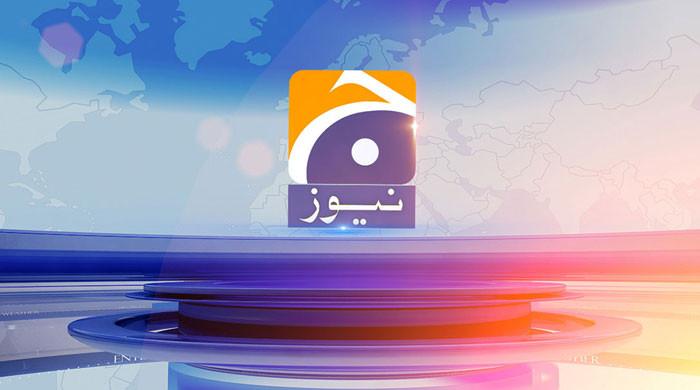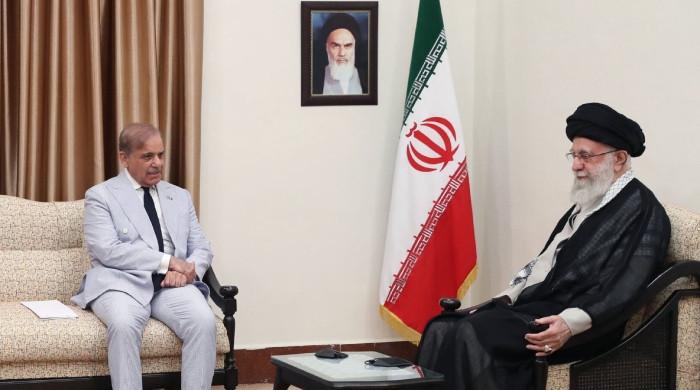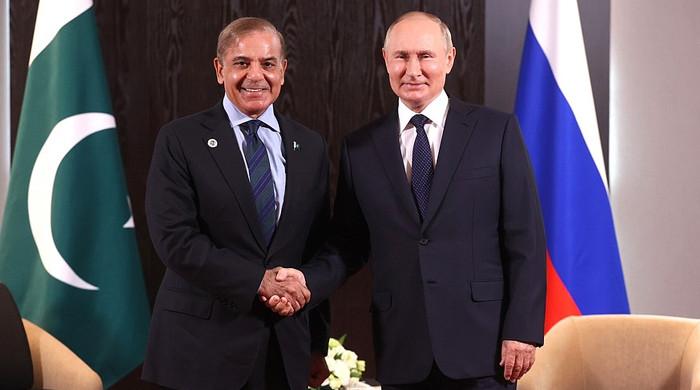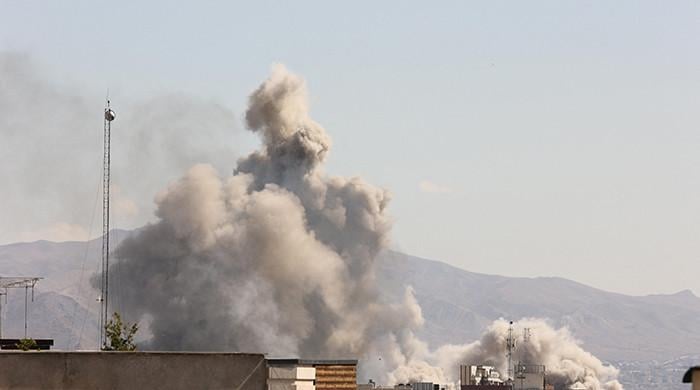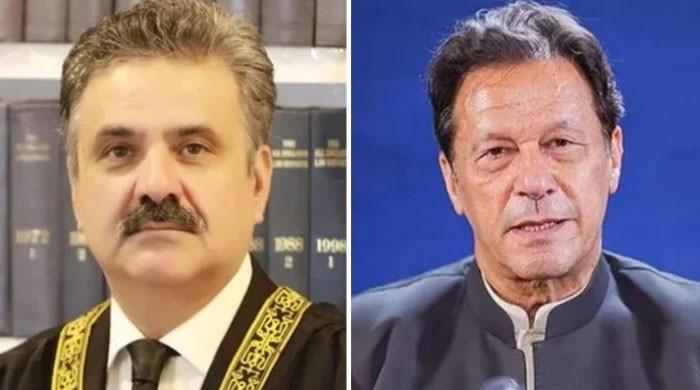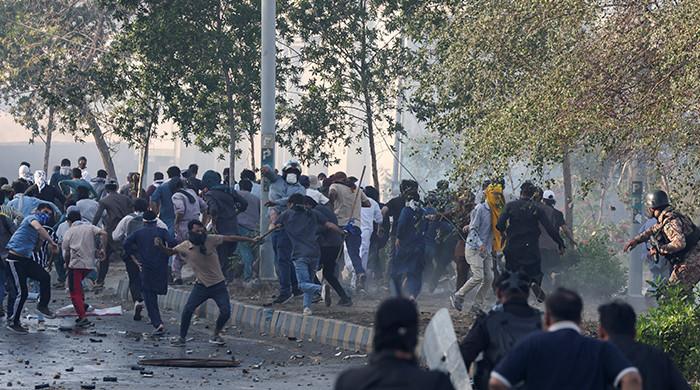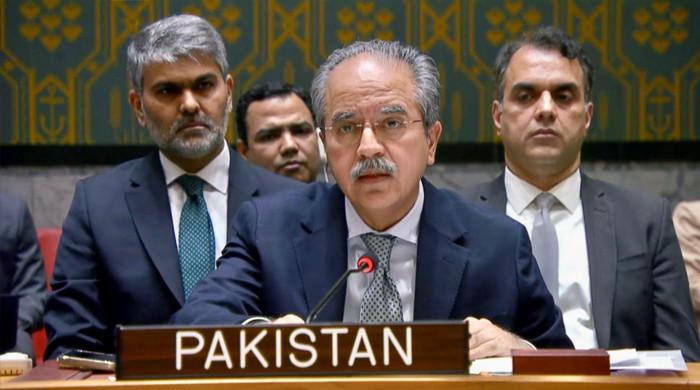PPP, PML-N trade blame as sugar price reaches historic high
Former commerce minister Naveed Qamar responsible for the current sugar crisis, claims PML-N's Ahsan Iqbal
September 04, 2023
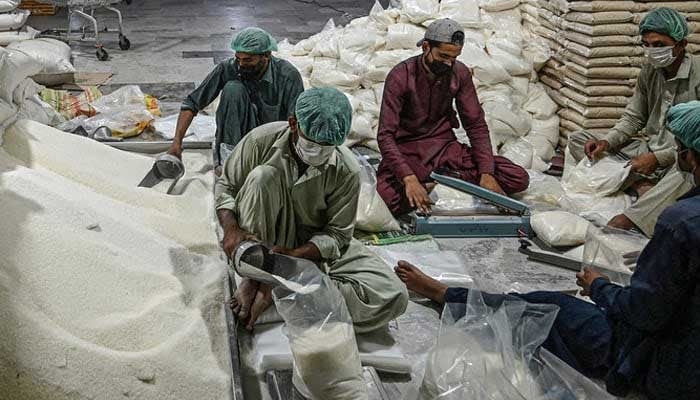
- Sweetener becomes more expensive than flour and milk for first time.
- Cost of commodity is between Rs180 to Rs215 per kg in serval cities.
- Sugar crisis can create serious problems for caretaker government, says Ahsan Iqbal.
LAHORE/ KARACHI/ ISLAMABAD: Amid the exorbitant increase in price of refined sugar across country, the Pakistan People's Party (PPP) and the Pakistan Muslim League-Nawaz (PML-N), two major coalition partners of the former government, point fingers at each other as the commodity becomes more expensive than flour and milk for the first time in the country's history, The News reported on Monday.
The price of indispensable food item of daily routine diet is between Rs180 to Rs215 per kg in several cities across Pakistan after an increase of up to Rs20 per kg during the last week alone.
Earlier on September 1, the Pakistan Sugar Mills Association (PSMA) had rebuffed reports of shortage of the essential commodity saying that the scarcity of sugar “is routine off-season rise”.
The publication further reported that the steep upward trend in sugar prices is being blamed on unabated sugar smuggling to Afghanistan through the Balochistan and Khyber Pakhtunkhwa (KP) land routes in addition to back-to-back increases in petroleum prices in the country, which led to an upsurge in transportation cost.
Speaking to host Shahzad Iqbal on the Geo News programme ‘Naya Pakistan’, PML-N senior leader and former federal minister Ahsan Iqbal said the main reason for the current crises in the country was uncertainty, created by vested interests to fulfil their malicious designs.
Iqbal added that if not handled properly, even the sugar crisis could create serious problems for the caretaker government. The country would have to be freed from the clutches of mafias if it is to be put on the road to success, he asserted.
The former planning minister further added that the PPP leader and former trade minister Naveed Qamar could better answer any questions about the export of sugar in the past months, and would also be in a better position to tell the nation how much sugar stocks were available for domestic consumption when his ministry allowed its export.
“The outgoing PDM government was a coalition government, and the PML-N could not be held responsible for everything wrong happening during its tenure,” he said. “The sugar export issue was also raised in the cabinet meeting, and only the former minister concerned could inform the people on what grounds the export of the commodity was allowed.”
Furthermore, Iqbal added that the trade ministry must have informed the then prime minister Shehbaz Sharif that sugar was available in abundance, and its export would not affect the prices of the commodity locally.
The trade ministry, he continued, under Qamar, was responsible for the current sugar crisis and the increase in its price.
Iqbal said that the commerce and trade ministry decides what commodity should be exported and what not. The trade ministry decides to send a summary to the Economic Coordination Committee (ECC) or the cabinet for approval of the export of the commodity, he added.
The former minister asserted the country would have to get rid of elite capture, smuggling, cartelisation, and mafias to make progress. He regretted that mafias had got hold of almost all the sectors, which were holding the state hostage.
To a question by the host that the PPP and MQM say the PML-N was responsible for all the economic decisions, Iqbal responded former premier Shehbaz never took any national decision on his own, and always consulted all the coalition partners.
“All the member parties were responsible for all national decisions. It was not good that the coalition partners enjoyed their ministries in the past but when any objection was raised by opponents, they would say they were only conducting foreign visits and were not responsible for anything that went wrong,” the PML-N leader said.
On the other hand, responding to Iqbal’s statement, PPP Sindh General Secretary Senator Waqar Mehdi said that while there was no doubt the PPP had the Ministry of Commerce in the previous coalition government, one should keep in mind that key decisions pertaining to the economic policies were being taken by authorities that belonged to the PML-N.
Mehdi told The News that such matters pertained to the economic policies of the country whose matters were decided by the former federal finance minister and finally by the prime minister, who in the past government both belonged to the PML-N.
He added if the sugar prices were high in the country, then it was a matter pertaining to inflation and that the PML-N should better respond to the issue when it had the key ministries in the previous setup, including finance, planning and development, and petroleum in addition to the office of prime minister.
“Ahsan Iqbal is a seasoned politician and he should not blame the ex-coalition partners for such issues pertaining to governance. The coalition government is all about accepting the principle of collective responsibility,” said the PPP leader.
He also recalled that former prime minister, in his farewell speech in the National Assembly, particularly praised the performance and wisdom of Qamar as his cabinet colleague in the capacity of commerce minister.
“As far as I recall, the former PM in his farewell remarks in the house praised just the performance of Naveed Qamar. He did not even mention any of his cabinet colleagues from the PML-N,” he added. Mehdi regretted that a negative campaign was being run against former PPP ministers.
Prices of sugar across country
The retail price of sugar has soared to over Rs200 per kg in Balochistan border belt with Afghanistan; it is being sold at Rs220 per kg in Noshki. The residents of Quetta, Kohlu and Washik are made to buy sugar at Rs200 per kg.
In Peshawar and Charsadda in KP, the price of sugar went through the roof as well. It is being sold at Rs190 to Rs205 per kg. Its price surged to Rs180 per kg in Mansehra, Abbottabad and Swat while the commodity’s price swelled to Rs190 per kg in Gilgit.
The people of Gujranwala, Bahawalpur, Jhang and Gujrat are witnessing the price hike of sweetener up to Rs185 and Rs190 per kg. Its price hovers around Rs180-185 per kg in Lahore, Karachi, Sukkur, Thatta, Multan and Rahim Yar Khan.
In contrast, the price of flour is inching towards Rs170-180 per kg in several cities of Balochistan and KP while it is being sold at around Rs140 per kg in most of Punjab and Sindh provinces.
Similarly, fresh milk price ranges between Rs165 to Rs200 per litre in the country. Most brands of processed packaged milk are being sold in excess of Rs215 per litre. The one-litre pouch of pasteurised milk is being sold at Rs185-190 per litre.
Interestingly, sugar crossed the Rs100 per kg mark briefly in 2021 while it settled at around Rs125 per kg in the latter half of the last year.
However, this year, despite the government’s attempt to fix the price of commodity at Rs98 per kg, it is feared to balloon to over Rs200 per kg in the entire country in the next few weeks, said market insiders. The Lahore High Court (LHC) has issued a stay order against official notification of controlled sugar price, said an official of the provincial Food Department.
In comparison, according to data collected by PSMA, the average retail flour price was Rs101 per kg in 2020-21 and Rs116 per kg in 2021-22. Likewise, the price of fresh milk was reported at Rs105 per litre in 2020-21 and Rs114 per litre in 2021-22.
However, the average retail sugar price in these two years remained at Rs94 and Rs96 per kg respectively, according to the PSMA.






